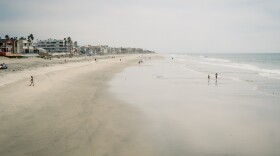Ground zero of some of the distrust between Muslims and the larger community might just be in Clairemont, where two of the 9/11 hijackers lived at the Parkwood Apartments.
The apartments are now condos with picture-book, white-trimmed facades. But the remodeling hasn’t erased the memory of the building’s one-time occupants for Esther. (She didn’t want her real name used out of fear her comments might offend.) She believes the attacks were a watershed moment in the relationship between Muslims and the larger community.
“It’s probably changed forever," Esther said. "I think you’re leery when you’re walking down the street and you see someone. I actually had two women who wore scarves and talked in their own language. You just wonder because not everyone is good.”
And that wondering is palpable to Rawya Emalt, who lives just blocks away. She’s worn a head scarf since she came to the United States from Egypt 30 years ago. Before the 9/11 attacks, she felt at ease. After, Emalt said she felt harsh stares.
Her message to non-Muslims is a plea for acceptance.
“Don’t judge us by what we look like," Emalt said. "Wearing a scarf doesn’t mean anything. It doesn’t mean we’re oppressed. It’s a choice I did for myself. It doesn’t mean I’m against humanity. It doesn’t mean I’m a terrorist.”
That is what Imam Hassane Taha of the Islamic Center of San Diego finds Muslims constantly have to reiterate whenever there’s a terrorist attack by someone from their faith.
"They always think we are responsible for what happened over there," Taha said. "So every time we have to go out to the media and condemn, and (say) we had nothing to do with it, our faith had nothing to do with it. To be honest with you, it’s time consuming. It’s not easy.”
The fact that two of the 9/11 hijackers -- Khalid Al-Midhar and Nawaf Al-Hazmi -- prayed at the Islamic Center of San Diego, and one even used an account at the mosque to wire money from Saudi Arabia, hasn’t helped public perception. But Taha said it’s a perception that needs to change.
“The community here doesn’t feel the guilt of what happened here on 9/11 because it has nothing to do with it," Taha said. "We don’t have control on people. We don’t ask people who come to the mosque, 'what is your intention?' We don’t even ask them what is their faith?”
And why should they, asks Emalt. She said she’s tired of Muslims constantly being called to account for their brethren’s actions in a way that members of other religions are not.
“The guy that did the killings in Norway … no one said anything about the Christian religion or the Christian community that he’s related to. He’s just a bad guy that did an evil action,” Emalt said.
Taha said many Muslims also believe they are subjected to heightened government scrutiny. Published reports three years ago indicated the Islamic Center in San Diego was under FBI surveillance.
"I don’t think this is something moral," he said. "We have nothing to hide as Muslims here at the Islamic Center of San Diego. We are open everyday. We are open to all people. If anyone has any concerns, he or she is more than welcome to come and talk to us.”
Taha said government spying has made many Muslims feel targeted for their religion.
San Diego FBI spokesman Darrell Foxworth said that perception is incorrect.
“We’re not focusing our investigation directly on the house of worship. For us to initiate an investigation, we have to have some information which indicates there’s a violation of federal law or that there’s a threat to national security.”
Foxworth said the bureau has met continuously with Muslims to make that point.
"I found it also to be at times challenging, but what we have to keep in mind is that we have to continue to partner together in order to make all of us safer here," he said.
Partnership is also important, Imam Taha says, with the larger society. Taha meets regularly with Christian and Jewish leaders to talk about faith issues. There’s more understanding and empathy among the communities now than 10 years ago and that’s been an unexpected benefit, he said.
“Before 9/11, the Muslim community -- especially the leadership -- did a very poor job of building bridges of respect between Muslims and non Muslims. After 9/11 it’s not optional," Taha said.
A Gallup poll this spring suggested efforts like those are working. Younger liberal Americans are less likely to see American Muslims as a threat to national security.
But older, more conservative Americans tend to be suspicious of Muslims in the United States.
Esther -- at the Clairemont street where two of the 9/11 hijackers once lived --believes the changing population has forced her to be more open.
“I grew up in a white community, Catholic, they weren’t here; and now they’re everywhere," she said. "I look at people as individuals. I don’t categorize them just because they look different."






